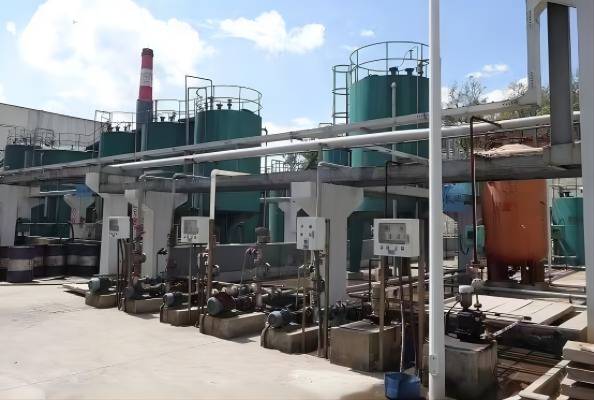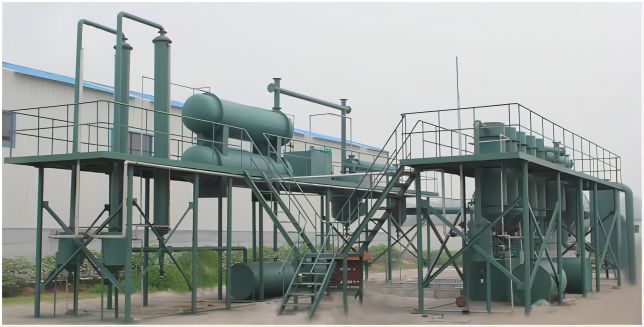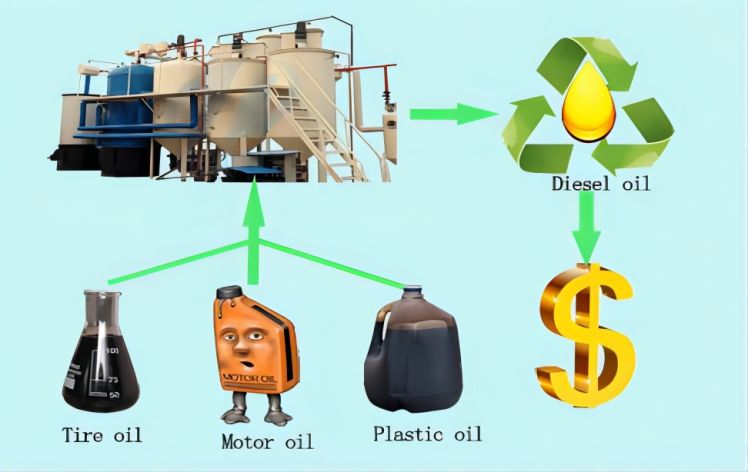Waste Engine Oil Recycling of Environmental Protection Measures
Improper disposal of used engine oil poses a significant threat to the environment. Engine oil contains hazardous components that can contaminate soil and water if not managed responsibly. This article outlines the environmental protection measures employed by responsible waste engine oil recycling businesses throughout the process, from collection and transportation to storage, processing, and reuse. It also highlights the significant environmental benefits associated with proper waste engine oil recycling.

Responsible Waste Engine Oil Management
Effective waste engine oil recycling begins with safe and responsible collection and transportation practices.
A. Collection and Transportation
1. Secure Collection Systems
Responsible waste engine oil recycling businesses establish secure collection systems to ensure used oil is collected and stored safely before transportation. This involves providing designated containers for used oil at generation points, such as auto repair shops, quick-change oil service centers, and industrial facilities. These containers must be clearly labeled and of a suitable size and material to prevent leaks or spills. Trained personnel are crucial for proper collection. Employees should be knowledgeable about safe handling procedures for used oil, including proper container management, spill response protocols, and the importance of avoiding contamination with other materials (like antifreeze or coolant).
2. Responsible Transportation Practices
Once collected, used engine oil needs to be transported safely to processing facilities. This necessitates proper labeling of transport vessels with clear identification of the contents as “Used Oil” and any relevant hazard information. Spill prevention measures are essential during transportation. This may involve using secondary containment, such as drip pans placed under containers or leak-proof transport vehicles specifically designed for hazardous materials. Responsible businesses utilize licensed haulers who comply with all local, state, and federal regulations governing the transport of hazardous materials.
B. Storage and Processing
1. Secure Storage Facilities:
Safe storage of used engine oil is paramount to prevent environmental contamination. Reputable recycling facilities have secure storage areas designed to contain used oil and prevent leaks. These areas typically feature features like:
- Impervious Surfaces: Storage areas are constructed with non-porous surfaces like concrete or sealed asphalt to prevent oil from seeping into the ground.
- Curb Containment: Curbs or berms are built around storage areas to contain any spills or leaks, preventing them from spreading to surrounding areas.
- Secondary Containment: Additional containment measures, such as double-walled storage tanks or specially designed liners, may be used to provide an extra layer of protection in case of a primary tank leak.
Leak prevention practices are also crucial. This includes regularly inspecting storage tanks and piping for signs of damage or corrosion, and having a spill response plan in place to address any potential leaks promptly and effectively.
2. Pre-Processing Considerations:
Before the actual recycling process begins, used oil may undergo pre-processing steps. This often involves filtration to remove solid contaminants like dirt, metal shavings, or other debris that may have accumulated in the oil during its use. Additionally, some recycling facilities may employ techniques to remove water from the used oil. Water contamination can compromise the quality of the recycled oil product.

Sustainable Practices in Waste Engine Oil Recycling
Once collected, transported, and stored securely, used engine oil can be recycled using various methods.
1. Repurposing and Reuse Options
The most desirable outcome for waste engine oil recycling is repurposing it back into high-quality lubricants. Through a process called re-refining, used oil can be cleaned and treated to remove contaminants and impurities, resulting in a product with properties very similar to virgin base oil. This re-refined oil can then be used to formulate new lubricating oils for various applications.
Another reuse option is fuel blending. Used oil can be processed and blended with virgin fuel oil to create a usable fuel source for industrial applications like boilers or cement kilns.
2. Minimizing Environmental Impact
Even with advanced recycling techniques, some used oil may not be suitable for re-refining or fuel blending due to heavy contamination or degradation. Responsible recycling facilities have processes in place to ensure the safe and environmentally sound disposal of these residuals. This may involve using high-temperature incineration facilities that meet strict emissions standards to minimize any potential air pollution.
The Environmental Benefits of Waste Engine Oil Recycling
By adopting responsible collection, transportation, storage, and processing practices, waste engine oil recycling businesses offer significant environmental advantages.
A. Resource Conservation
The primary environmental benefit of waste engine oil recycling is resource conservation. Extracting virgin crude oil is an energy-intensive process with environmental consequences, such as habitat destruction and potential spills during exploration and drilling.
Recycling used engine oil significantly reduces the demand for virgin oil extraction. This translates to:
- Reduced Energy Consumption: The process of extracting, refining, and transporting virgin crude oil requires vast amounts of energy. Waste engine oil recycling utilizes a smaller fraction of this energy compared to virgin oil production, resulting in a lower overall environmental footprint.
- Habitat Preservation: Extracting crude oil often necessitates drilling in sensitive ecosystems. By reducing reliance on virgin oil, waste engine oil recycling helps conserve these habitats and the biodiversity they support.
B. Pollution Prevention
Improper disposal of used engine oil poses a serious threat to soil and water resources. Leaked or dumped oil can contaminate soil, rendering it unsuitable for plant growth. Furthermore, oil can seep into groundwater supplies, making them unsafe for drinking or supporting aquatic life.
Waste engine oil recycling effectively eliminates these risks. By collecting and processing used oil responsibly, recycling facilities prevent environmental contamination and protect these vital resources.
C. Responsible Waste Management:
The concept of a circular economy emphasizes minimizing waste and maximizing resource recovery. Waste engine oil recycling embodies this principle by transforming a potential environmental hazard into a valuable resource. By diverting used oil from landfills and putting it back into productive use, recycling facilities contribute to a more sustainable waste management system.

Conclusion
Partnering with a responsible waste engine oil recycling business is an essential step in protecting our environment. By adopting safe and sustainable practices throughout the collection, transportation, storage, processing, and reuse of used oil, these businesses play a vital role in conserving resources, preventing pollution, and promoting responsible waste management practices. Choosing to recycle used engine oil is a simple yet impactful way for individuals and businesses to contribute to a more sustainable future.







